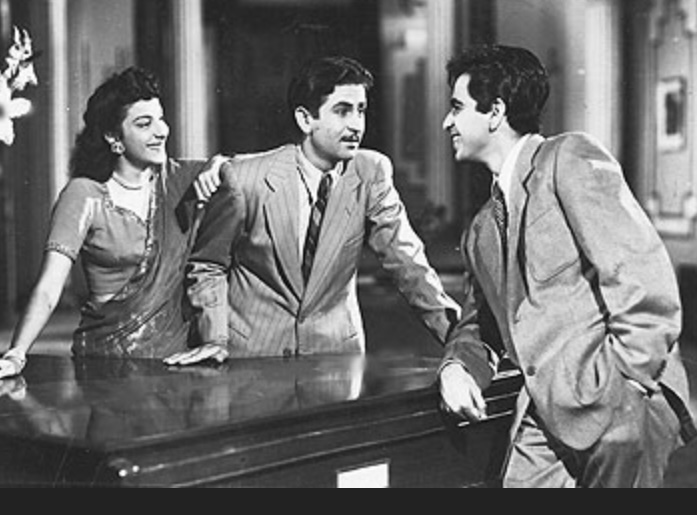Bollywood actor Dilip Kumar, who died last week, was many things to many people. He was a Bollywood legend, a screen hero, a public figure who spoke out for minority communities, a good and thoughtful human being, a great thespian. But while many fans will look at the entirety of his work during a career spanning over a half-century, my most cherished memories of it are from his early films – particularly Andaz.
My favourite image of Dilip Kumar will always remain of him seated at the piano singing in Mehboob Khan’s 1949 film Andaz. As he mouthed the songs (sung by the maestro Mukesh), his soulful eyes would surely have had many swooning: first as he ‘sang’ the optimistic ‘Hum aaj kahin dil kho baithay’ after he has fallen in love with the girl he thinks reciprocates his feelings and then, later, the tragic ‘Tootay naa dil toote na’ when he is heartbroken after the realisation that she regards him merely as a friend and is engaged to somebody else.
Andaz was an interesting film in that, despite a highly melodramatic and preachy ending, it addressed important post-colonial questions of identity and tradition in a newly independent nation. The love triangle – played by Dilip Kumar, Nargis and Raj Kapoor – comes about largely because of Dilip (Dilip Kumar) misconstruing Neena’s (Nargis) friendly behaviour as romantic love. The film seems to regard this as a result of modernity and westernised behaviour and the social message is spelt out clearly in the pedantic monologue delivered by Rajan (Raj Kapoor) at the end of the film. But despite this rather oppressive message and the film’s completely tragic ending, I remember Andaz fondly both for its songs and for being the vehicle to unite three such fabulous actors on the screen (this was the only film Dilip Kumar and Raj Kapoor did together).

Andaz also fuelled my interest in searching out more of Dilip Kumar’s films from this early period and so I landed on his Daagh (Amiya Chakravarty’s 1952 film) in which again the beautiful songs (sung by Talat Mahmood) did much to complement the tragic nuances of Dilip Kumar’s expressions. Another old film I sought out eagerly was Jugnu as it starred Dilip Kumar opposite our own Nur Jehan. Well, that was certainly disappointing: Jugnu was made in 1947, so I had assumed both young actors would look amazing on-screen and would make a great romantic screen couple. However, in Shaukat Hussain Rizvi’s film, there is absolutely no screen chemistry between the pair and while Dilip Kumar does look quite beautiful, Nur Jehan looks almost old enough to be his mother. Even the youthful two long braids hairstyle and a lineup of very plain (and oppressed looking) female extras as her ‘sahelis’ does nothing to make her look stunning.
In K Asif’s epic Mughal e Azam, Dilip Kumar played Shahzada Salim, the prince whose love for the courtesan Anarkali is thwarted by his father, the Mughal emperor Akbar. Here Dilip Kumar appeared puffier and played a far less endearing personality than in previous tragedies: his Prince Salim was a slimy sort of a character and fairly dislikeable. The on-screen chemistry with Madhu Bhala may have been sizzling and the film’s songs and cinematography memorable but this on-screen Dilip was not one I wanted to remember.

So, I have to say I never really followed Dilip Kumar’s later films as I preferred to stay stuck with the image of him singing ‘Tootay naa dil’ and ‘Ai mere dil kahin aur chal’, etc, but I did follow news of him. His connection to my city, Karachi, was that he was a cousin or kinsman of the well-known orthopaedic surgeon Dr Rahim. His connection to Pakistan was that Peshawar was his ancestral city and he was much loved by many on this side of the border. But when he was awarded the Nishan-e-Imtiaz by Pakistan in 1998, a furious backlash followed in an outcry, which was led by the RSS (Rashtriya Swayamsevak Sangh) and the BJP (Bharatiya Janata Party). The actor seems to have handled this with great dignity but he stated quite clearly in subsequent interviews that he believed he was being targeted because of being a Muslim and a member of a minority community. And it was possibly this episode that led him to a stint in politics as a Congress party member of the legislative assembly. To his credit, he refused to succumb to the pressure generated by right-wing hysteria and he refused to return the award.
They are all gone now, those stylish leading men from the early post-partition era of Bollywood cinema. We remember Dev Anand and Raj Kapoor and Kishore Kumar and so many of their contemporaries in many different and completely personal ways. I choose to remember Dilip Kumar always through those black and white images of him in Andaz: so young and beautiful and moving with such easy grace, mesmerising us with his nuanced and sensitive facial expressions.
‘Toote naa dil tootay naa
Saath humara chootay naa’
Thank you for the memories, Dilip Kumar aka Yusuf sahib







